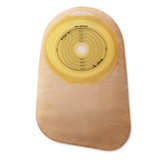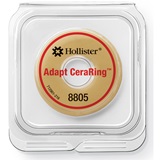Tips for Coping in a Crisis
Two ostomy community leaders discuss effective ways to stay positive when times get tough.

Get tips on how to handle unexpected change when living with an ostomy.
Living through a crisis is hard for anyone, but there is an extra layer of concern for people with ostomies. Hollister sat down with two influential people in the ostomy community to find out how they cope during challenging times.
Amber Wallace is the creator of the Ostomy Diaries YouTube channel and social media platforms, and Dr. Paul Wischmeyer, MD is a critical care, perioperative, and nutrition physician at Duke University School of Medicine in Durham, North Carolina. Both Amber and Paul live with an ostomy.
Q: How can people with ostomies stay healthy both physically and emotionally when facing a crisis?
Amber: The best way to take care of your emotional health is to take care of your physical health. Continue to take your supplements. Stick to a schedule and make checklists. During a difficult time, I do the same things at the same time every day and that helps. It’s also important to get enough rest and exercise, even if you have to find a routine online. Grief and anxiety can manifest physically if you don’t put those things into practice.
Paul: I agree with taking the proper supplements. Some of us with ostomies absorb vitamins differently, so it’s important to consult your doctor before starting a regimen. Exercise is also very important. As a senior in college, I was doing research with a doctor at Mayo Clinic. One day he said, “Paul, you’re getting soft and look a little out of shape – do you want to keep getting sick? You should start running and taking better care of yourself.” I had never had anyone say that before and was motivated (and a little miffed) so I started running and ran almost every day for a year. And when that same doctor performed my tenth surgery to remove my failed ileal pouch, it took only four hours instead of eight. Afterwards he said, “Your abdomen looked like you never had surgery – your adhesions were gone! Whatever you did in the last year, you should definitely keep it up!” I haven’t stopped running and exercising since.
Q: What can we do to stay healthy if we have to travel during a health crisis?
Amber: It’s important to keep a change of ostomy supplies on your person when travelling and make sure to stay hydrated. We all have leak stories. One time I
was hiking in the Great Smoky Mountains and my pouch fell off. I had to change it in a porta potty! And, of course, I use hand sanitizer constantly, especially on my phone.
Paul: I’ve had leaks on planes and have had to run to the washroom with it pouring down my leg. Never a dull moment with an ostomy some days! I keep supplies in a small kit. I also always wear an ostomy belt, which helps keep my pouch secure. When my wife and I travel now we wear masks and bleach wipe everything we have to touch.
Q: Where should people turn when having a really bad day?
Amber: Stay connected with nature and focus on things that are beautiful. Take a moment and be still. Keep grounded and turn to your faith. It’s OK to cry and let those emotions out. Recognize it, feel it, and embrace it. There’s a myth that if you ignore depression it will go away. You have to deal with it before you can move ahead. Last year after my wedding I was feeling down and didn’t know why. I was too ashamed to tell anyone. So I decided to speak to my doctor. He ran some tests and it turned out that my vitamin levels were out of whack. Never be ashamed to talk to your doctor, that’s what they’re trained in.
Paul: Well, as I shared before, exercise has been a true lifesaver for me. When I’m down I also often turn to my family. Being vulnerable is hard especially when you’re sick. I often have trouble loving myself with a body that could turn on me and threaten my life at any moment. Just a few years ago, I was sick again and needed three surgeries and a prolonged hospital stay (almost a month). My wife slept every night at my bedside in the hospital. Through that I realized that perhaps I am loveable no matter what. When feeling depressed, another resource I often use is to connect to the ostomy community on Instagram and other social media. I’ve seen so many people get support from others all over the world. It’s definitely healing to share your story…and to hear others and know you are not alone.
Q: A crisis can present problems with participating in milestone events, such as graduations and funerals. How can people still stay connected?
Amber: If it’s a death, you can honor them by the way you live your life and stay positive. That’s how you can keep their memory alive. If it’s a graduation or birthday, plan something with the person or people when you’re feeling better or the crisis is over. Connection is so important. Check in with people, even your happy friends. You never know what they’re going through. Gratefulness works too, I write down one thing I’m grateful for each day and put it in a jar.
Paul: I agree about gratefulness. In our family, we play a game every night called “3 GOOD THINGS” where we all go around and name three good things that happened each day. At our hospital we are spending conscious time thanking people for the little things they do. Getting out of your head and thanking someone else is so essential and therapeutic. It’s so important especially if you’re down. Gratitude is as rewarding to yourself as it is to the one you’re thanking.
Q: What’s the best way to help a loved one cope with an emotional crisis?
Paul: Don’t talk, just listen. A subtle touch on the hand can mean so much. Open body language, walking all the way into a patient’s room and sitting down and making eye contact shows that you are present with them. I teach residents to sit down at eye level with their patients, and never cross their arms. I sit low in the hospital and ICU rooms all the time so I can get at eye level with my patients!
Amber: Even if they don’t feel like talking, let them know you’re there if they want to. Talk about something positive to help get their mind off of what’s going on. And I agree about touch. I was rushed to the hospital in an ambulance and had lost a lot of blood. They couldn’t get an IV started and the doctor stopped and held my hand. A nurse said, “Doctor, what are you doing?” And she said, “Right now holding her hand is most important.”
Q: How can people with ostomies balance staying informed with protecting their mental health?
Amber: Find a credible source and follow the medical professionals. I always cite where I get my information in the Ostomy Diaries. Limit your exposure to the media. You have to take time to focus on something else; don’t let a crisis captivate your thoughts. I only check the news in the morning and evening.
Paul: I stay informed in many ways, through podcasts and scientific sources. We as physicians and healthcare providers most often communicate and debate new data and ideas via Twitter. We share the things that are relevant to patients and cite our sources. I also learn so much from the ostomy community on social media. In fact, I’ve learned more in the last year as a physician about my ostomy from the people who live with an ostomy than I learned in 35 years with my own ostomy and more than 25 years in my medical practice.
Amber Wallace is the creator of the Ostomy Diaries YouTube Channel, and social media platforms. She has a Bachelor of Science degree, and loves teaching High School Chemistry, Biology, and Physical Science. She is currently a graduate student pursuing a Masters degree in Secondary Education. Amber feels that sharing her story has been healing and hopes it helps provide a sense of community for others who may feel alone or hopeless. Check out more of her journey on Facebook, Twitter, and Instagram (@ostomydiaries).
Paul E. Wischmeyer, MD, EDIC, FASPEN, FCCM is a critical care, perioperative, and nutrition physician who serves as a Professor with Tenure of Anesthesiology and Surgery at Duke University School of Medicine in Durham, North Carolina. He also serves as the Associate Vice Chair for Clinical Research in the Dept. of Anesthesiology and Director of the Nutrition Team at Duke Hospital. His career work is focused helping patients prepare and recover from surgery (including ostomy and IBD surgery) and from IBD and other illnesses.
The statements and opinions presented are applicable to the people depicted. These testimonials are representative of their experience, but the exact results and experience will be unique and individual to each person. Financial Disclosure: Amber and Paul received compensation from Hollister Incorporated for their contributions to this article.
- 2 Shares
- 38 Recommended





 Call Us
Call Us  Email Us
Email Us  Join Us!
Join Us!  Sign Up
Sign Up 